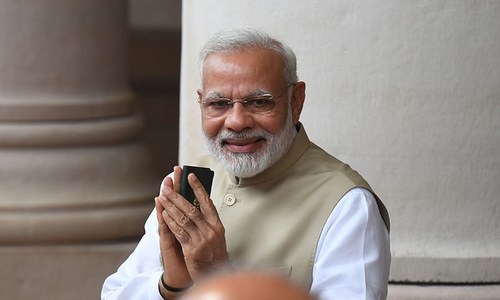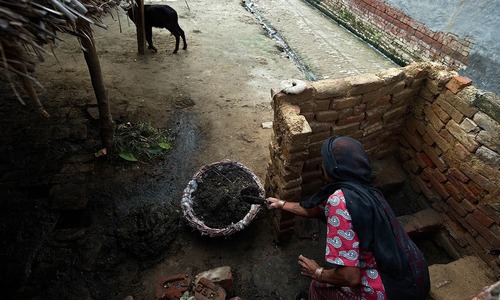
THESPIAN Dilip Kumar used an interesting metaphor in his movie Kranti, or revolution. The earthy couplet went thus: “Kulhadi mein lakdi ka dasta na hota, to lakdi ke katney ka rasta na hota.” (But for the wood in the axe, there would be no axe to cut the wood.) The words came to mind strangely enough because of this week’s presidential election in India.
Though they are constitutional heads, not executive chiefs, Indian presidents, like the speakers of parliament, can play a critical role in tipping the balance when the headcount is vague. And sometimes even when the numbers of MPs or MLAs is crystal clear, the chair can devise its own logic to decree otherwise.
West Bengal Governor Keshri Nath Tripathi, for example, split the Bahujan Samaj Party when he was speaker of the Uttar Pradesh assembly, giving his Bharatiya Janata Party undue political advantage. Herman Goering, as speaker or president of the Reichstag, deliberately avoided looking at president Hindenburg’s signed orders to dissolve the German parliament. His agenda was to take a sham vote to consolidate Hitler as a powerful Nazi chancellor. When he did deign to see the presidential decree on his desk, Goering concluded it was too late to consider as the house had already elected a Nazi government. The speaker’s verdict became the prelude to a global tragedy.
President Shankar Dayal Sharma need not have invited Atal Behari Vajpayee for an arbitrarily contrived 13-day tryst as prime minister. The BJP was in a hopeless minority in 1996, and Vajpayee resigned without facing the trust vote. Rajiv Gandhi had more seats as the largest party in 1989 than Vajpayee got in 1996, but he chose to sit in the opposition. President Kalam would have been well within his rights to invite Sonia Gandhi to be prime minister as she had the highest tally. It is a matter of surmise whether he did invite her. Ms Gandhi had a better chance of enduring the required vote of confidence than did Vajpayee.
What is astonishing is that victims of tyranny often become ardent supporters of the oppressor who targets their flock.
Prime Minister Modi’s handpicked candidate for president is Ram Nath Kovind, a Dalit gentleman who was governor of Bihar until recently. He was previously a spokesman for the BJP. It was a shrewd move to name Kovind as next president, and it has already driven fissures in the opposition’s ranks. The fractious groups for better or worse have put up former Lok Sabha Speaker Meira Kumar as their face-saving candidate. She is also a Dalit. The current arithmetic favours Kovind, but we are told that the men in Nagpur who control the BJP are not pleased about his candidature.
Seen from legendary Dalit stalwart B.R. Ambedkar’s view, Kovind and Kumar would both seem to be the wood in the axe, a metaphor Dilip Kumar used for Indians who betrayed their own people on behalf of the colonial rulers. Ambedkar regarded the Congress as an upper-caste Hindu party, and he would not have a very different view of the BJP. There are black Americans and American Muslims who voted for Donald Trump. Dalits voting for the Congress or the BJP is not altogether surprising.
It shouldn’t really matter whether a dictator or a regime is Christian or Muslim or Jewish, or atheist. What is astonishing is that victims of their tyranny often become ardent supporters of the oppressor who targets their flock. This behaviour in essence and texture is different from the Stockholm syndrome as more often than not it involves dollops of opportunism driven by a human desire to be on the winning side.
There were Jews who supported the Nazis and there are Dalits, no matter how minuscule, who are at peace with Hindutva. This is regardless of the fact that Hindutva in its essence was originally the brainchild of orthodox Bengali Brahmins. Their Maharashtrian cousins honed it into a political vehicle subsequently.
Such deals with the tormentors may involve members of other groups and communities too. It cannot not be disturbing, after all, that Muslim ministers in Mr Modi’s cabinet or Muslim politicians in the BJP are able to sleep soundly without a pinch of remorse when a Junaid is lynched here or a Pehlu Khan is murdered there by Hindutva mobs.
There are other groups that are critical of Mr Modi but seem to be convinced that there are bigger fish to fry. The left, for example, is on the same side as the BJP in their anti-Mamata Banerjee hostility. Loyal leftists are distraught that the communist party in West Bengal sees the staunchly anti-BJP chief minister as a more immediate threat to its existence, a fear that is at variance with the way the rest of worried India regards the problem. The fight between the Dravida parties in Tamil Nadu, or the Mayawati and Akhilesh Yadav bad blood in Uttar Pradesh, contributes to their collective peril ahead.
Meanwhile, according to the data compiled from India’s National Crime Records Bureau, a crime is committed against a Dalit by a non-Dalit every 16 minutes. Every day upper-caste men rape more than four Dalit women; every week, 13 Dalits are murdered and six Dalits are kidnapped. In 2012 alone, which was during Congress rule, the year of the Delhi gang rape and murder, 1,574 Dalit women were raped. The rule of thumb is that an inordinately low percentage of rapes is reported or gets registered. Dalits were exploited and abused regardless of who ruled Delhi, and their lot doesn’t seem to be heading for a better future under the BJP.
And as we write, another axe is being readied, inevitably with the help of the wood, of course. There is a metaphor of hope, however, to foil to the axe. It is said that the oak tree creates the very acorn from which it was born.
The writer is Dawn’s correspondent in Delhi.
Published in Dawn, July 18th, 2017













































